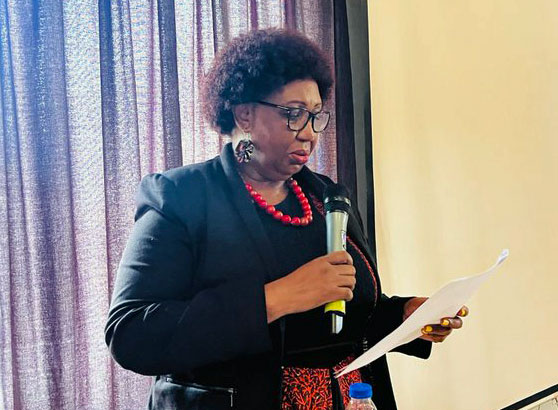
Mariam Wangadya, chair of the Uganda Human Rights Commission.
By Joto La Jiwe
The Chair of the Uganda Human Rights Commission (UHRC) Mariam Wangadya has called for the decriminalization of homosexuality, at a training event about Medical-Legal Documentation of Torture Cases in Kampala last week.
“I call on the government to take steps towards decriminalizing victimless crimes such as prostitution and homosexuality. Criminalizing such acts often results in unjust and disproportionate punishment, especially for vulnerable groups in our society,” she said.
She noted that of the 939 cases currently pending hearing before the UHRC tribunal, 50% of those are allegations of violation of the right to freedom from torture and inhuman and degrading treatment.
“While we focus on torture cases, I want to urge us to reflect on a broader context—the criminalization of behaviors and identities that harm no one,” Wangadya said, referring to the rights of LGBTQI+ persons and sex workers.
Wangadya said that after the passage of the Anti-Homosexuality Act last year, the commission took a decision to create a desk which is wholly devoted to human rights and dignity for the LGBTQI+ community.
“One of the complaints I have personally received is about a lesbian woman who is battling custody of her children. I have assured her of 100% support in this matter. Rights of parents on custody matters, or on any other issue must be equally protected by the law regardless of the sexual identity of the parent in issue,” she says.
The UHRC repeated Wangadya’s call for decriminalization of homosexuality in a series of posts on its X (formerly Twitter) account.
The UHRC has come under criticism for its muted response to the human rights abuses committed by the state against LGBTQI+ persons and opposition activists.
Human rights defenders are saying Wangadya’s statements in support of LGBTQI+ peoples’ human rights are coming as a pleasant surprise.
“I am pleasantly surprised that this government body is active and functional. Let us hope this is a step in the right direction towards a country that is respectful of everyone’s rights regardless of their sexual orientation and gender identity,” Steven Kabuye, a Ugandan LGBTQI+ rights advocate now based in Canada, posted on X.
“Even a broken clock is right twice a day. Thank you Wangadya,” Hillary Taylor, aka Justice Hunter, a human rights activist based in the US posted on X.
The Uganda Human Rights Commission (UHRC) was established under the 1995 Constitution of the Republic of Uganda. The decision to establish a permanent body to monitor the human rights situation in the country was in recognition of Uganda’s violent and turbulent history that had been characterized by arbitrary arrests, detention without trial, torture and brutal repression with impunity on the part of security organs during the pre and post-independence era.
The commission is charged with investigating complaints about human rights violations, to review and assess the conditions in jails and prisons, and to recommend measures to improve human rights to parliament.
In September, Wangadya met with LGBTQI+ rights advocates at the Human Rights Awareness and Promotion Forum (HRAPF). After the meeting, she posted on X, “I was glad to interact with @hrapf and representatives of the LGBTQI+ community. We must ensure that every person in Uganda enjoys their human rights without discrimination.”
Dr. Adrian Jjuuko, the head of HRAPF welcomed Wangadya’s newfound commitment to human rights for all.
“Thank you Madam Chairperson for this progressive step. We appreciate your concern for the human rights of criminalized minorities. Much respect,” Jjuuko posted on X.
The United Nations human rights office in Uganda was forced to close in 2023 after the Ugandan government decided not to renew the agreement allowing its operation.
The closure came amid concerns regarding human rights violations, including extrajudicial killings, as well as the Anti-Homosexuality Act, which imposes the death penalty on certain homosexual acts.
Joto La Jiwe, the author of this article, is a Ugandan correspondent for the African Human Rights Media Network. He writes under a pseudonym. Contact him at [email protected].
COMMENTS